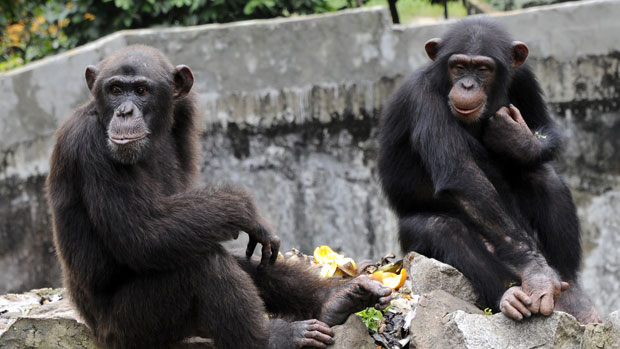Boozy chimps caught chugging alcohol in the wild
Chimpanzees filmed drinking fermented tree sap, lending weight to 'drunken monkey hypothesis'

A free daily email with the biggest news stories of the day – and the best features from TheWeek.com
You are now subscribed
Your newsletter sign-up was successful
A group of 26 chimps living in the Boussou region of Guinea have been filmed over a 17-year period drinking a type of fermented tree sap called palm wine.
The local villagers in the region regularly tap into the trees and collect its sap, which then ferments into a drink with alcoholic content as high as seven per cent.
The primates however, have been found drinking directly from the tap, fashioning the tree's leaves into a cup-like sponge.
The Week
Escape your echo chamber. Get the facts behind the news, plus analysis from multiple perspectives.

Sign up for The Week's Free Newsletters
From our morning news briefing to a weekly Good News Newsletter, get the best of The Week delivered directly to your inbox.
From our morning news briefing to a weekly Good News Newsletter, get the best of The Week delivered directly to your inbox.
Reporting their findings in the Royal Society of Open Science, the scientists said the chimps were also found to indulge in "drinking sessions" not unlike those of their human cousins.
"Individuals either co-drank, with drinkers alternating dips of their leaf-sponges into the fermented palm sap, or one individual monopolised the container, whereas others waited their turn."
In scenes sure to alarm those critical of 24-hour drinking rules, some of the party animals were even seen partaking in 7am drinking sessions.
The Guardian notes that the observations are in line with the "drunken monkey hypothesis" of evolution, which states that natural selection favoured primates with a taste for alcohol, because it stimulated the appetite, helped them hunt for fruit and so boosted calorific intake.
A free daily email with the biggest news stories of the day – and the best features from TheWeek.com
"About ten million years ago, our ancestors – and those of apes – gained a genetic mutation that improved 40-fold our ability to break down ethanol. Without it, consuming large amounts would be even more dangerous," says the newspaper.
However, the lead scientist on the study, Dr Kimberley Hockings, told the New York Times that the chimps "may drink the sap more for its nutritional value than its alcohol" and said that there was no evidence to suggest the animals obtain the drink without the help of unwitting humans.
-
 Political cartoons for February 7
Political cartoons for February 7Cartoons Saturday’s political cartoons include an earthquake warning, Washington Post Mortem, and more
-
 5 cinematic cartoons about Bezos betting big on 'Melania'
5 cinematic cartoons about Bezos betting big on 'Melania'Cartoons Artists take on a girlboss, a fetching newspaper, and more
-
 The fall of the generals: China’s military purge
The fall of the generals: China’s military purgeIn the Spotlight Xi Jinping’s extraordinary removal of senior general proves that no-one is safe from anti-corruption drive that has investigated millions
-
 Epstein files topple law CEO, roil UK government
Epstein files topple law CEO, roil UK governmentSpeed Read Peter Mandelson, Britain’s former ambassador to the US, is caught up in the scandal
-
 Iran and US prepare to meet after skirmishes
Iran and US prepare to meet after skirmishesSpeed Read The incident comes amid heightened tensions in the Middle East
-
 Israel retrieves final hostage’s body from Gaza
Israel retrieves final hostage’s body from GazaSpeed Read The 24-year-old police officer was killed during the initial Hamas attack
-
 China’s Xi targets top general in growing purge
China’s Xi targets top general in growing purgeSpeed Read Zhang Youxia is being investigated over ‘grave violations’ of the law
-
 Panama and Canada are negotiating over a crucial copper mine
Panama and Canada are negotiating over a crucial copper mineIn the Spotlight Panama is set to make a final decision on the mine this summer
-
 Why Greenland’s natural resources are nearly impossible to mine
Why Greenland’s natural resources are nearly impossible to mineThe Explainer The country’s natural landscape makes the task extremely difficult
-
 Iran cuts internet as protests escalate
Iran cuts internet as protests escalateSpeed Reada Government buildings across the country have been set on fire
-
 US nabs ‘shadow’ tanker claimed by Russia
US nabs ‘shadow’ tanker claimed by RussiaSpeed Read The ship was one of two vessels seized by the US military